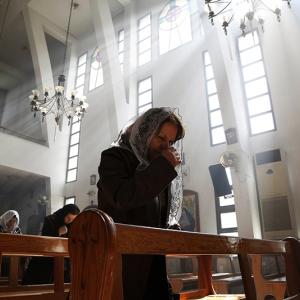
Chris Seiple is president emeritus and chair of the board for the Institute for Global Engagement. A former Marine infantry officer with a doctorate in international relations, he travels frequently to the Middle East region on behalf of IGE's Cradle Fund initiative.
Posts By This Author
Getting to Root Causes
Three ways Christians can respond to the ISIS crisis.

Anton_Ivanov / Shutterstock
EVERY TIME I travel from Erbil, the capital of Iraqi Kurdistan, to Dohuk, Iraq, my drivers point to the same bridge. This, they say, is where ISIS was stopped by U.S. air power, just 15 miles from Erbil. It is a vital reminder that Kurdistan has twice been a safe haven: in the 1991 aftermath of the first Gulf War, to protect the Kurds from Saddam Hussein, and again last year when ISIS was at the city gates.
When I look on the Nineveh Plain just south of Kurdistan, it’s hard not to recall Cyrus the Great, who once conquered this entire part of the world. The book of Isaiah recounts God’s words to the mighty king, a nonbeliever, one who didn’t follow the God of Israel: “For the sake of Jacob my servant, of Israel my chosen, I summon you by name and bestow on you a title of honor, though you do not acknowledge me” (emphasis added).
The chaos and violence in this region continues to drive people from their homes. Currently, Kurdistan is the temporary “home” of 1.1 million people fleeing ISIS. Most are people of faith—Muslims, Christians, and Yazidis. The ripple effects spread out to refugee camps from Jordan to Germany.
Many U.S. Christians don’t think of God when it comes to geopolitics. We sometimes reduce Christ “the Lord of all” to Christ “our personal savior.” We might not be comfortable with the idea that if Christ is truly sovereign, then that includes our global politics.
As people of faith, we never give up hope, even in the violent situation in the Middle East, which promises to get worse before it gets better. Here are three steps you can take to address the ISIS crisis and its violent ripple effects:
5 Reasons Why Christians Should Stay in the Middle East

An Assyrian woman attends a Mass on March 1, 2015, inside Ibrahim al-Khalil church in Jaramana, eastern Damascus, in solidarity with the Assyrians abducted by Islamic State fighters in Syria. Photo via REUTERS / Omar Sanadiki / RNS
It would be nice to consider emigration as a realistic option. But it is not. I would suggest pundits spend that same time and money fighting for a clear and concrete objective, declaring and defending a safe haven on the Nineveh Plain for Christians, Muslims, and Yazidis.
Yes, there are some high-risk situations that demand emigration. But, in general, Western Christians should think hard about how not to be an accomplice to ISIS.